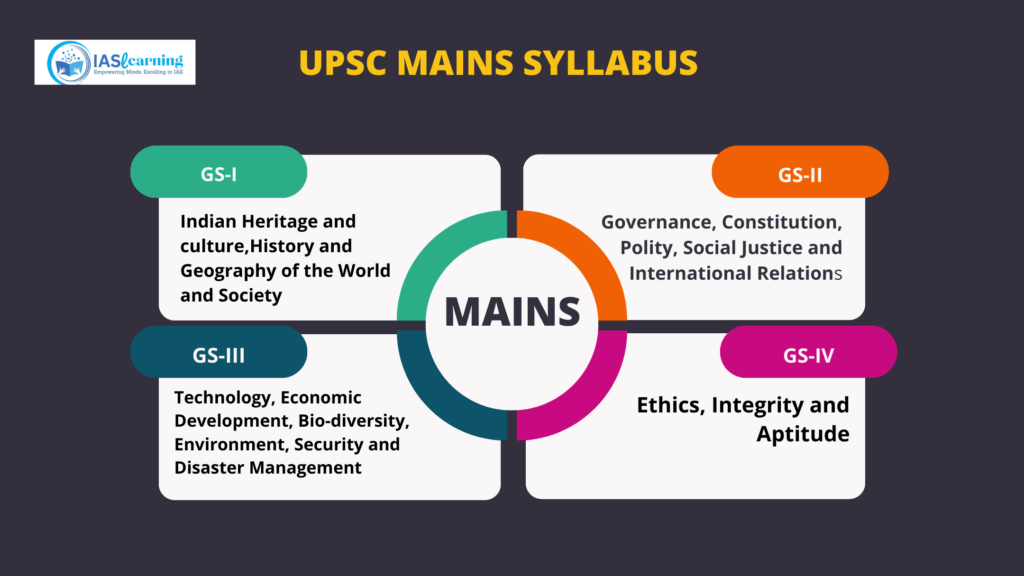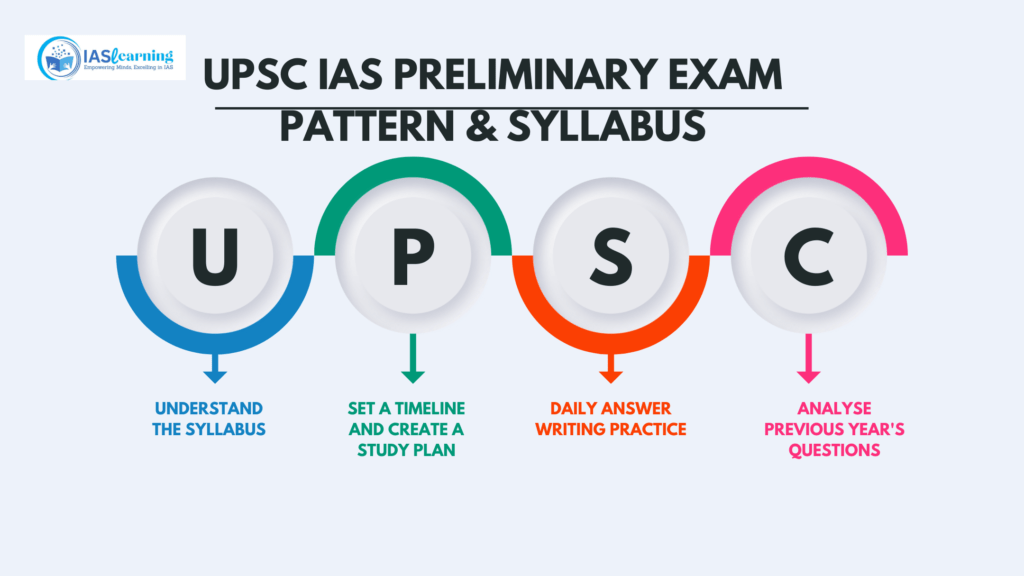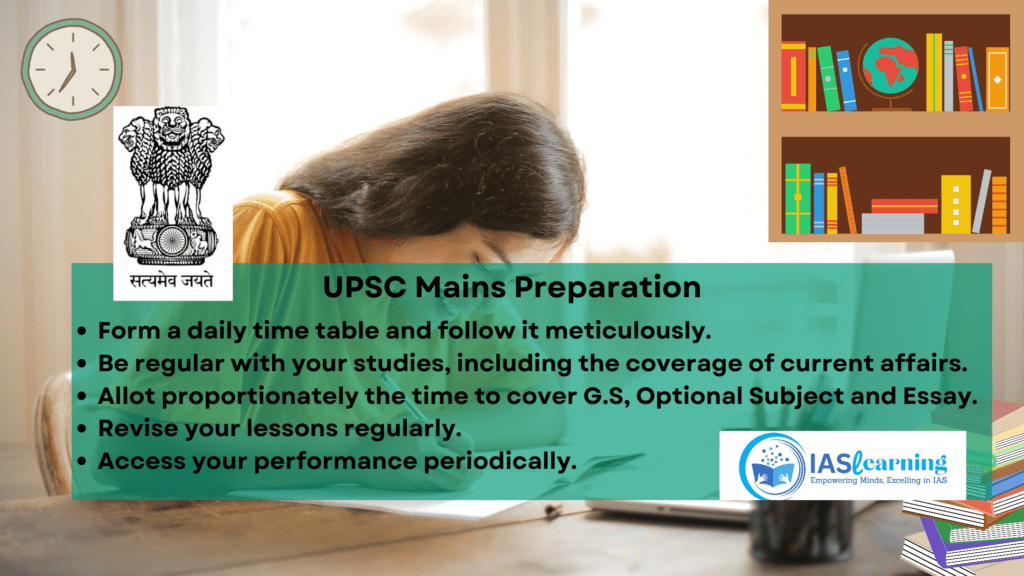UPSC Mains Preparation
The UPSC Mains examination is the most crucial phase of the Civil Services Examination (CSE) and plays a significant role in determining your selection and rank. It includes seven papers, all of which are conducted over a week. The examination evaluates a candidate’s depth of knowledge, analytical abilities, and articulation skills.
Strategy for UPSC Mains Preparation:
Understand the Syllabus Thoroughly

- Start by reading the UPSC Mains syllabus carefully to understand the scope and topics.
- A clear understanding of the syllabus helps in focused preparation.
Create a Study Schedule for UPSC Mains Preparation
- Make a realistic study schedule that allocates sufficient time to each paper.
- Ensure that you stick to your schedule.
Practice Answer Writing for UPSC Mains Preparation
- Writing practice is crucial. Regularly practice answer writing to improve your writing skills.
- Analyse previous years’ question papers and practice with them.
- Focus on structuring your answers logically with an introduction, body, and conclusion.
- Use bullet points and diagrams where necessary for clarity.
Current Affairs for UPSC Mains Preparation
- Keep yourself updated with current affairs through newspapers like “The Hindu” and magazines.
- Integrate current affairs into your general studies preparation to provide a contemporary perspective.
Take Mock Tests for UPSC Mains Preparation
- Enroll in a good test series to simulate the exam environment.
- Regularly take mock tests to assess your progress.
- Analyse your performance and work on your weak areas.
Revision:
- Regular revision is essential to retain information.
- Create concise notes and mind maps for quick revision.
- Revise your optional subject thoroughly.
Seek Guidance: for UPSC Mains Preparation

- It’s beneficial to seek guidance from experienced mentors, teachers, or fellow aspirants.
- Join discussion groups and forums to share and gain knowledge.
Syllabus and Papers:
Paper-I: Essay (250 marks):
- Candidates have to write two essays.
- Essays must cover diverse topics, from philosophical to contemporary issues.
- Critical thinking, clarity, and coherence are essential.
Paper-II: General Studies I (250 marks):
- Includes Indian Heritage and Culture, History, and Geography of the World and Society.
- It covers subjects like art and culture, modern history, world history, post-independence India, and geography.
- Books to refer: “India’s Struggle for Independence” by Bipan Chandra, “Indian Art and Culture” by Nitin Singhania, “Certificate Physical and Human Geography” by Goh Cheng Leong.
Paper-III: General Studies II (250 marks):
- Encompasses Governance, Constitution, Polity, Social Justice, and International Relations.
- Topics include Indian polity, international relations, and governance.
- Books to refer: “Indian Polity” by M. Laxmikanth, “Introduction to the Constitution of India” by D.D. Basu.
Paper-IV: General Studies III (250 marks):
- Covers Technology, Economic Development, Bio-diversity, Environment, Security, and Disaster Management.
- Topics include Indian economy, environmental issues, technology, and disaster management.
- Books to refer: “Indian Economy” by Ramesh Singh, “Environment and Ecology” by Shankar IAS.
Paper-V: General Studies IV (250 marks):
- Focuses on Ethics, Integrity, and Aptitude.
- Includes case studies to assess a candidate’s ethical judgment.
- Books to refer: “Lexicon for Ethics, Integrity, and Aptitude” by Chronicle, “Ethics, Integrity, and Aptitude” by G. Subba Rao and P.N. Roy Chowdhury.
Paper-VI: Optional Subject Paper I (250 marks):
- The optional subject should be chosen based on your interest and comfort level.
- The syllabus will depend on the subject chosen.
- Choose standard books and materials relevant to your chosen optional subject.
Paper-VII: Optional Subject Paper II (250 marks):
- Continuation of the optional subject paper.
- Keep focusing on your chosen optional subject.
Booklist for UPSC Mains Preparation:

General Studies I:
- “India’s Struggle for Independence” by Bipan Chandra
- “Indian Art and Culture” by Nitin Singhania
- “Certificate Physical and Human Geography” by Goh Cheng Leong
- Newspapers like “The Hindu” for current affairs
General Studies II:
- “Indian Polity” by M. Laxmikanth
- “Introduction to the Constitution of India” by D.D. Basu
- Newspapers like “The Hindu” for current affairs
General Studies III:
- “Indian Economy” by Ramesh Singh
- “Environment and Ecology” by Shankar IAS
- “Science and Technology” by Ravi Agrahari
- Newspapers like “The Hindu” for current affairs
General Studies IV (Ethics):
“Lexicon for Ethics, Integrity, and Aptitude” by Chronicle
“Ethics, Integrity, and Aptitude” by G. Subba Rao and P.N. Roy Chowdhury
Optional Subject (Paper I and II):
This will depend on your choice of optional subject. Popular options include History, Geography, Public Administration, Sociology, Political Science, and many more. Choose a good booklist as per the specific subject.
Essay Paper:
- “Essays for Civil Services” by Pulkit Khare
- Practice essay writing with topics from previous years.
Important Tips:
Understand the UPSC Syllabus Comprehensively:
- A deep understanding of the syllabus is fundamental. It ensures that you know what topics to cover and what to focus on. The UPSC Mains syllabus is vast, and a clear comprehension of it allows you to prioritize your studies.
Make a Realistic Study Schedule:
- Your study schedule should be realistic and achievable. Take into account your strengths and weaknesses, and allocate time accordingly. Avoid overburdening yourself, as it can lead to burnout. Consistency in following the schedule is key.
Emphasize Answer Writing Practice:
- Answer writing practice is a game-changer. It helps you develop the skill to present your knowledge effectively. Focus on structuring your answers, using clear language, and presenting your arguments logically. Regular practice is essential to improve this skill.
Keep Current Affairs Integrated into Your Preparation:
- Current affairs are a crucial component of the UPSC Mains examination. Read newspapers like “The Hindu” and magazines to stay updated. Integrate current affairs into your general studies preparation to understand the contemporary context of various topics.
Regularly Take Mock Tests and Revise:
- Mock tests simulate the actual exam environment and help you identify your strengths and weaknesses. They also assist in time management. After taking mock tests, thoroughly analyze your performance and focus on areas that need improvement. Regular revision is vital to retain information and reinforce your knowledge..
Conclusion:
The UPSC Mains examination is a rigorous test of knowledge, analytical skills, and writing abilities. A well-structured strategy that covers all papers, from essay writing to optional subjects, is essential. Moreover, the responsible regulation of online gaming, along with taxation policies, is crucial to balance revenue generation with promoting responsible gaming practices. Stay committed to your preparation, seek guidance, and practice consistently to excel in the UPSC Mains examination.




